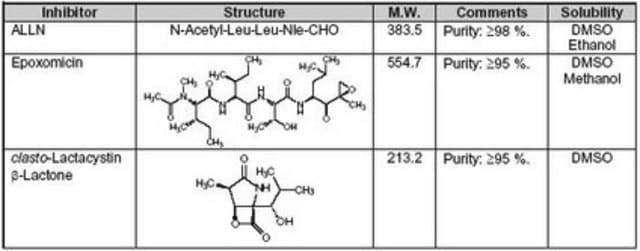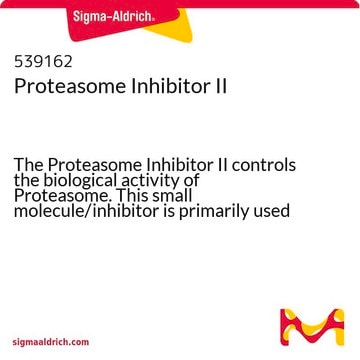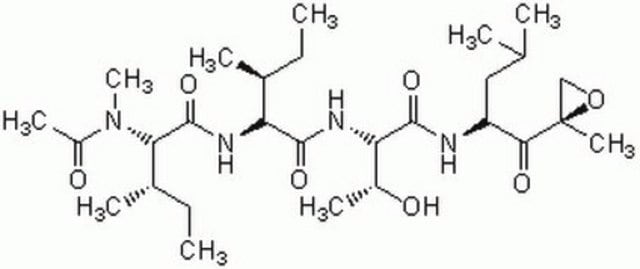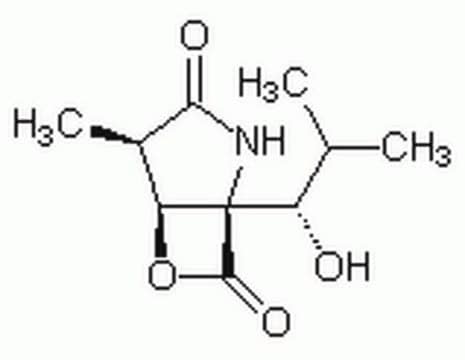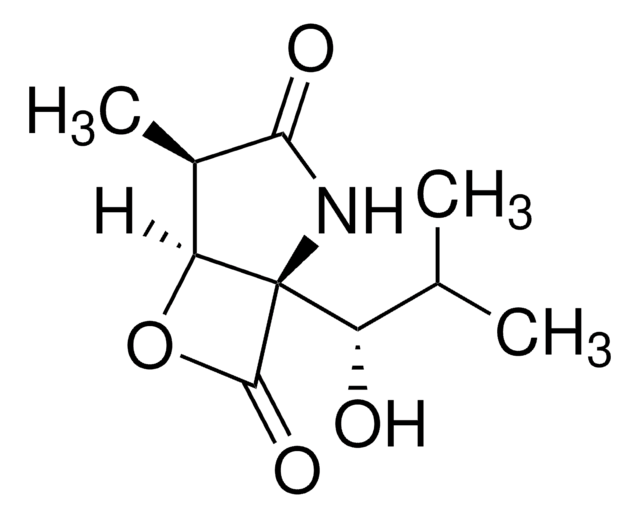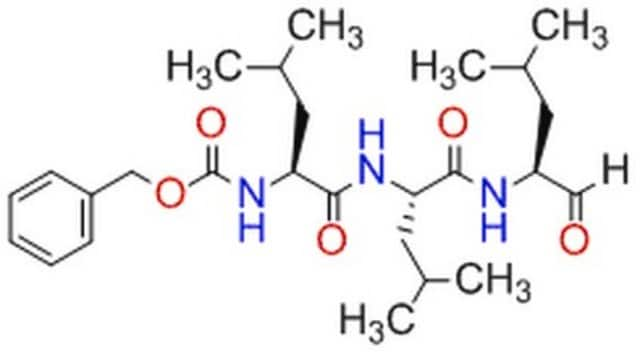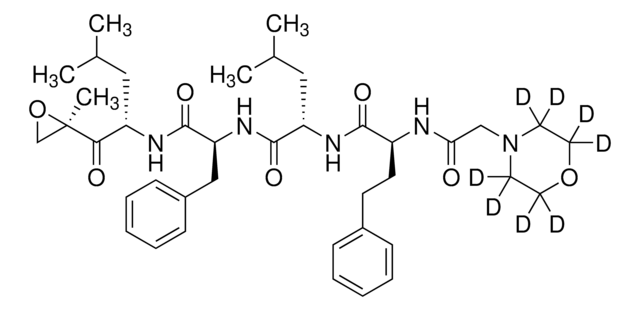539164
Proteasome Inhibitor Set I
The Proteasome Inhibitor Set I controls the biological activity of Proteasome. This small molecule/inhibitor is primarily used for Protease Inhibitors applications.
Přihlásitk zobrazení cen stanovených pro organizaci a smluvních cen
About This Item
UNSPSC Code:
12352200
NACRES:
NA.77
Doporučené produkty
Quality Level
form
solid
manufacturer/tradename
Calbiochem®
storage condition
OK to freeze
shipped in
ambient
storage temp.
−20°C
General description
Proteasomes are large multi-subunit protease complexes, localized in the nucleus and cytosol, which selectively degrade intracellular proteins. They play a major role in the degradation of many proteins involved in cell cycling, proliferation, and apoptosis. A vast majority of short-lived proteins are degraded by the ubiquitin-proteasome pathway. A protein marked for degradation is covalently attached to multiple molecules of ubiquitin (Ubq), a highly conserved 76-amino acid (8.6 kDa) protein, which escorts it for rapid hydrolysis to the multi-component enzymatic complex known as the 26S proteasome. The proteolytic core of this complex, the 20S proteasome, contains multiple peptidase activities and functions as the catalytic machine.
The ubiquitin-proteasome pathway plays a major role in the breakdown of abnormal proteins that result from oxidative stress and mutations that might otherwise disrupt normal cellular homeostasis. The reactive oxygen species can promote partial unfolding of the proteins, exposing its hydrophobic domains to proteolytic enzymes of the 20S complex. Rapid degradation of defective enzymes, as seen in diseases caused by metabolic abnormalities, also occurs in the proteasome. The Ubq-proteasome pathway has also been implicated in several forms of malignancy, in the pathogenesis of several genetic diseases, and in the pathology of muscle wasting. It is also involved in the destruction of proteins that participate in cell cycle progression, transcription control, signal transduction, and metabolic regulation.
The ubiquitin-proteasome pathway plays a major role in the breakdown of abnormal proteins that result from oxidative stress and mutations that might otherwise disrupt normal cellular homeostasis. The reactive oxygen species can promote partial unfolding of the proteins, exposing its hydrophobic domains to proteolytic enzymes of the 20S complex. Rapid degradation of defective enzymes, as seen in diseases caused by metabolic abnormalities, also occurs in the proteasome. The Ubq-proteasome pathway has also been implicated in several forms of malignancy, in the pathogenesis of several genetic diseases, and in the pathology of muscle wasting. It is also involved in the destruction of proteins that participate in cell cycle progression, transcription control, signal transduction, and metabolic regulation.
Biochem/physiol Actions
Primary Target
MPC
MPC
Secondary Target
NF-κB activity
NF-κB activity
Warning
Toxicity: Standard Handling (A)
Other Notes
Grimm, L.M., et al. 1996. EMBO J.15, 3835.
Griscavage, J.M., et al. 1996. Proc. Natl. Acad. Sci. USA93, 3308.
Lee, D.H., and Goldberg, A.L. 1996. J. Biol. Chem.271, 27280.
Oda, K., et al. 1996. Biochem. Biophys. Res. Commun.219, 800.
Fenteany, G., et al. 1995. Science268, 726.
Traenckner, E.B., et al. 1994. EMBO J.13, 5433.
Griscavage, J.M., et al. 1996. Proc. Natl. Acad. Sci. USA93, 3308.
Lee, D.H., and Goldberg, A.L. 1996. J. Biol. Chem.271, 27280.
Oda, K., et al. 1996. Biochem. Biophys. Res. Commun.219, 800.
Fenteany, G., et al. 1995. Science268, 726.
Traenckner, E.B., et al. 1994. EMBO J.13, 5433.
Legal Information
CALBIOCHEM is a registered trademark of Merck KGaA, Darmstadt, Germany
Storage Class
11 - Combustible Solids
Osvědčení o analýze (COA)
Vyhledejte osvědčení Osvědčení o analýze (COA) zadáním čísla šarže/dávky těchto produktů. Čísla šarže a dávky lze nalézt na štítku produktu za slovy „Lot“ nebo „Batch“.
Již tento produkt vlastníte?
Dokumenty související s produkty, které jste v minulosti zakoupili, byly za účelem usnadnění shromážděny ve vaší Knihovně dokumentů.
Zákazníci si také prohlíželi
Související obsah
Select different protease inhibitor types based on your needs to prevent protein degradation during isolation and characterization and safeguard proteins in sample prep.
Náš tým vědeckých pracovníků má zkušenosti ve všech oblastech výzkumu, včetně přírodních věd, materiálových věd, chemické syntézy, chromatografie, analytiky a mnoha dalších..
Obraťte se na technický servis.

